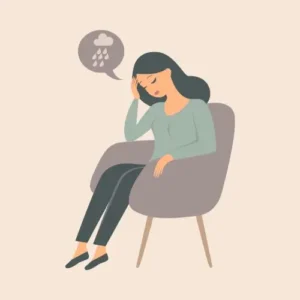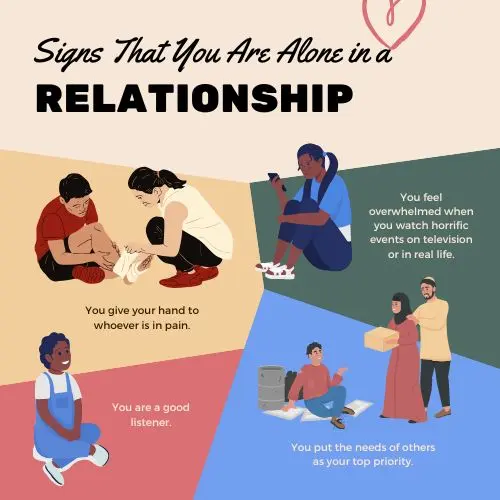Introduction
In a world where we are always connected, we are more alone than ever, especially in intimate relationships. The complexities of life and individual differences can create cracks that lead to emotional isolation. This article will cover feeling alone in a relationship, the signs, and how to bridge the gap. One key section will be “20 Signs You Are Alone in a Relationship”—a checklist to help you figure out how you feel.
| Topic | Details |
|---|---|
| Definition of Emotional Isolation | Understanding the concept |
| Statistics on Relationship Loneliness | Insights from recent studies |
| Impact of Emotional Isolation | Effects on mental health and well-being |
| Signs You Are Alone in a Relationship | 20 Key indicators |
| Steps to Address Emotional Isolation | Practical tips to reconnect |
| Conclusion | Summarizing the importance of awareness |
Definition of Emotional Isolation
Emotionally, isolation occurs when the individual feels disconnected and unsupported in their relationships. This can even happen when staying together or engaging in social activities. Unlike the cause of physical isolation, emotional isolation comes from an individual’s emotional and psychological status. Symptoms of emotional isolation can be found through poor communication, unsettled conflicts, hectic lives, and other forms of stressors that ease the bond between the partners.
Statistics on Relationship Loneliness
Recent studies bring alarming insights into the phenomenon of emotional isolation in relationships:
- Stat 1: 51% of people in relationships feel lonely, according to the American Psychological Association
- Stat 2: Relationships with no emotional connection are 70% more likely to end in separation, according to the University of California
- Stat 3: 65% of couples have experienced emotional disconnection at some point in their relationship, according to the Journal of Social and Personal Relationships
Understanding these statistics underscores the importance of recognizing signs of emotional isolation in order to address them proactively.
Impact of Emotional Isolation

Emotional isolation can be a toxic poison to the relationship; therefore, it is toxic to our mental health. Lonely partners feel more anxious and depressed. Without any emotional support, we can also engage in other destructive behaviors: drugs, adultery, and withdrawal from society.
Over time, emotional isolation would creep in between them and thereby destroy the level of trust and intimacy between them, making reconciliation quite hard. Thus, these signs of emotional isolation need to be identified for a healthy relationship.
Signs You Are Alone in a Relationship
Here are 20 signs that you are alone in a relationship. If you identify with several of these points, it may be time to reassess your emotional connections:
- Poor communication: Just chatting about everyday things, not discussing feelings or personal matters.
- Feeling ignored: Your partner doesn’t recognize or appreciate your thoughts, emotions, or experiences.
- Little to no affection: Physical closeness and love are rare or missing, making you feel distant.
- Avoiding arguments: Afraid to discuss important topics to avoid fights, leaving problems unsolved.
- Separate lives: You and your partner live mostly separate lives with few shared activities or goals.
- Preferring solitude: You often feel alone or choose to be alone rather than spend time with your partner.
- No support: You don’t feel your partner is there for you during hard times, emotionally or otherwise.
- Easily annoyed: Small issues become big problems as you feel more disconnected.
- No interest in each other: You no longer ask about your partner’s day, hobbies, or feelings.(c)
- Hiding parts of your life: You keep certain things about your life from your partner because you’re afraid they might judge you or you’re not interested in sharing.
- Turning to friends for comfort: You rely more on your friends than your partner for emotional support.
- Avoiding important talks: You avoid or ignore serious discussions or planning for the future.
- Being dismissed: Your partner often ignores your feelings or makes light of your concerns.
- Finding joy elsewhere: You look for happiness and connection outside your relationship, often through hobbies or social groups.
- Less closeness: Emotional and physical closeness decreases over time.
- Feeling alone together: You feel lonely even when you’re physically together because you don’t connect emotionally.
- Different beliefs: Your core values and beliefs become increasingly different, making you feel disconnected.
- Always feeling down: You constantly feel sad or hopeless about the relationship.
- Focusing on tech instead of each other: Spending more time on phones, computers, or TVs instead of talking to each other.
- Unhappy with how the relationship feels: Feeling something isn’t right, even if you don’t know why.
Steps to Address Emotional Isolation
Recognizing that you are alone in a relationship is the first step towards change. Here are some practical tips to reconnect emotionally with your partner:
- Begin with Open and Honest Talks: Take time to talk about your feelings and worries. Use “I” statements to express yourself without pointing fingers.
- Make Time for Fun Together: Do things that bring you closer, like shared hobbies or simple date nights.
- Practice Active Listening: Pay full attention when your partner talks, understand their feelings, and respond with care.
- Seek Help if Needed: Think about seeing a couples therapist. A professional can help you improve communication and connection.
- Show Love Regularly: Make an effort to show physical and emotional love, strengthening your bond.
- Learn About Each Other’s Interests: Get to know each other’s hobbies, likes, and dislikes. This helps you connect and show you care.
- Set Shared Goals: Talk about and create common goals for the future, whether they’re about family, work, or personal growth.
- Promote Emotional Openness: Make a secure environment where both partners can share their feelings and thoughts without worrying about being judged.
- Practice Mindfulness Together: Participate in mindfulness or meditation activities that help you focus on the present moment and strengthen your bond.
- Celebrate Small Wins: Recognize each other’s emotions, hard work, successes, and minor ones.
Conclusion
It is not easy to feel lonely in a relationship. The 20 signs you might be alone in a relationship will help many become more aware they have to make a change. Awareness is the key; knowing when you and your partner are emotionally disconnected helps you work on fixing it and building a stronger connection.
Good relationships require communication and emotional intimacy with an effort. Well, luck with the right focus and commitment because things can get even better. Whether you talk with each other, get help from a professional, or do fun things together, reconnecting with your partner will bring that love, friendship, and understanding that makes you want to be together again.

